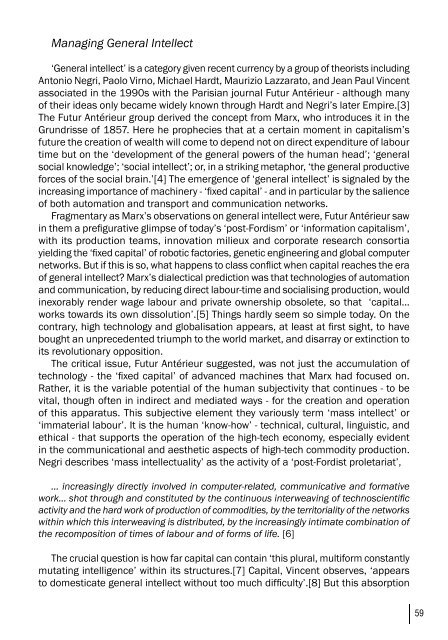art-e-conomy _ reader - marko stamenkovic
art-e-conomy _ reader - marko stamenkovic
art-e-conomy _ reader - marko stamenkovic
Create successful ePaper yourself
Turn your PDF publications into a flip-book with our unique Google optimized e-Paper software.
Managing General Intellect<br />
‘General intellect’ is a category given recent currency by a group of theorists including<br />
Antonio Negri, Paolo Virno, Michael Hardt, Maurizio Lazzarato, and Jean Paul Vincent<br />
associated in the 1990s with the Parisian journal Futur Antérieur - although many<br />
of their ideas only became widely known through Hardt and Negri’s later Empire.[3]<br />
The Futur Antérieur group derived the concept from Marx, who introduces it in the<br />
Grundrisse of 1857. Here he prophecies that at a certain moment in capitalism’s<br />
future the creation of wealth will come to depend not on direct expenditure of labour<br />
time but on the ‘development of the general powers of the human head’; ‘general<br />
social knowledge’; ‘social intellect’; or, in a striking metaphor, ‘the general productive<br />
forces of the social brain.’[4] The emergence of ‘general intellect’ is signaled by the<br />
increasing importance of machinery - ‘fixed capital’ - and in p<strong>art</strong>icular by the salience<br />
of both automation and transport and communication networks.<br />
Fragmentary as Marx’s observations on general intellect were, Futur Antérieur saw<br />
in them a prefigurative glimpse of today’s ‘post-Fordism’ or ‘information capitalism’,<br />
with its production teams, innovation milieux and corporate research consortia<br />
yielding the ‘fixed capital’ of robotic factories, genetic engineering and global computer<br />
networks. But if this is so, what happens to class conflict when capital reaches the era<br />
of general intellect? Marx’s dialectical prediction was that technologies of automation<br />
and communication, by reducing direct labour-time and socialising production, would<br />
inexorably render wage labour and private ownership obsolete, so that ‘capital…<br />
works towards its own dissolution’.[5] Things hardly seem so simple today. On the<br />
contrary, high technology and globalisation appears, at least at first sight, to have<br />
bought an unprecedented triumph to the world market, and disarray or extinction to<br />
its revolutionary opposition.<br />
The critical issue, Futur Antérieur suggested, was not just the accumulation of<br />
technology - the ‘fixed capital’ of advanced machines that Marx had focused on.<br />
Rather, it is the variable potential of the human subjectivity that continues - to be<br />
vital, though often in indirect and mediated ways - for the creation and operation<br />
of this apparatus. This subjective element they variously term ‘mass intellect’ or<br />
‘immaterial labour’. It is the human ‘know-how’ - technical, cultural, linguistic, and<br />
ethical - that supports the operation of the high-tech e<strong>conomy</strong>, especially evident<br />
in the communicational and aesthetic aspects of high-tech commodity production.<br />
Negri describes ‘mass intellectuality’ as the activity of a ‘post-Fordist proletariat’,<br />
… increasingly directly involved in computer-related, communicative and formative<br />
work… shot through and constituted by the continuous interweaving of technoscientific<br />
activity and the hard work of production of commodities, by the territoriality of the networks<br />
within which this interweaving is distributed, by the increasingly intimate combination of<br />
the recomposition of times of labour and of forms of life. [6]<br />
The crucial question is how far capital can contain ‘this plural, multiform constantly<br />
mutating intelligence’ within its structures.[7] Capital, Vincent observes, ‘appears<br />
to domesticate general intellect without too much difficulty’.[8] But this absorption<br />
59


